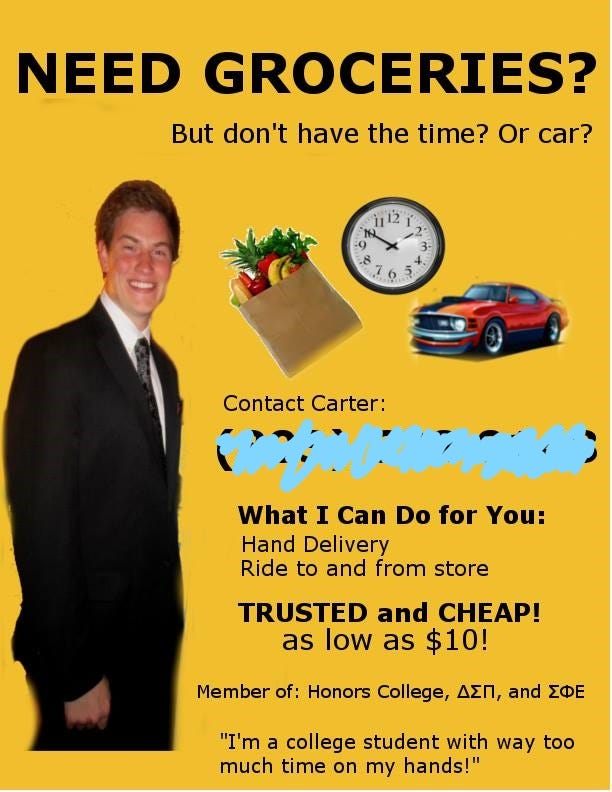That dreadful interview question.
Man, oh man, oh man.
Unfortunately, I have the most applicable, cringeworthy, face-scrunching, toe-curling example. It's one of those memories where you think back and shudder a little. Alright, a lot.
My big idea? A grocery delivery business. Cue the confetti and flashy lights.
Your initial reaction might be something like, "Ah, okay. That doesn't sound like a bad idea — it could be practical."
Yes, great in theory. Going grocery shopping takes time. Time is finite. People are lazy. But people need food. There's a natural connection.
In fact, this service exists. Little did I know, approximately 2,687 miles away in San Francisco, Instacart was creating the same idea. Just to set the message straight upfront, don't position my idea and Instacart's operations on the same level. That'll just make what I did look even more laughable.
But, anyway, the basic premise of Instacart was pretty much what I was going for.
Six years ago, back when I was a sophomore in college, I caught the entrepreneurial bug and wanted to start a business. I have to give ole college me some kudos for having big aspirations. I mean, I wound up starting my own business anyway, so maybe it was an integral chapter to my story.
I tried to identify problems, obstacles, burdens, etc. that students deal with on a daily basis. Somehow, someway, I conceived the idea to start a grocery delivery service — targeting college kids. Later, a friend would point out that this concept was very similar to a group project we'd done. So, in all likelihood, my unconscious mind drifted back to the idea.
I thought, "Hey, college kids don't have time to shop for groceries. I could do it for them."
Next level thinking right there. But here's why this was destined to fail…
The college students that have time to shop for groceries will do so. The college students that don't have time to shop for groceries — but can afford to pay someone else to — will just choose to go out to eat. The rest…well college students are thrifty and will find ways to eat and survive.
So, I didn't have a legitimate target market.
Another self-imposed obstacle: upfront research and planning. Or lack thereof. How extensive was my strategy development? I looked around to see if other campuses did this. Found out that a couple of moms at the University of Tennessee did something similar.
Perfect, it's foolproof.
The real kicker: I ran zero financial analysis to see if this was a viable idea and worthwhile time commitment. Past-me loses some kudos.
So, what happened?
Well. This happened.

This was my big reveal. A promotional masterpiece worthy of Picasso's signature. I posted this to Facebook and made quite a few peoples' days. This picture may have gotten over 200 likes and 30 comments, but I only received three service requests.
First Request
Prospect: "Is this the..uhhh..delivery service guy?" My very first order. How exciting. We made it.
Me: "Yes, sir — it is. What can I do for you?" My finest customer service voice on full display.
Prospect: "Yeah..uhh..could you get me some cigarettes and beer?"
Me: "…" Not exactly what I was going for. "I'm afraid I can't do that, I deliver groceries — not cigarettes and alcohol." Because that's illegal.
Disgruntled Prospect: "What? No, just bring me cigs and beer."
Me: "Look, I can't do that. I'm pretty sure that's illegal."
Disgruntled Prospect Who Was Willing to Compromise: "Well, can you at least get me cigs." To be honest, I considered it for a second.
Me: "No, sorry man. That's not what this is."
Call ended.
Second Request
Like I said, plenty of people found my idea humorous. So much so, it inspired a couple of drunk dudes to place a phony order for cheddar cheese and a case of beer. The giggling and word-slurring were the giveaways.
Maybe I should've explored an alcohol delivery service.
Final Request
Of the 30 Facebook comments, one was a legitimate inquiry. The comment read, "I'm [redacted]'s grandmother. Will call you about my cousin. You will be a big help."
"Great", I thought, "Her cousin must be a college student who needs groceries."
Nope.
About two weeks later, I received a phone call from said grandma.
Innocent Grandma: "Hello, this is [redacted]'s grandmother. Are you the delivery boy?"
Me: "Yes, ma'am! How can I help you?" Wasn't thrilled with the title, but sure.
Innocent, Yet Assertive, Grandma: "Wonderful, my cousin needs you to take him to and from the hospital every Monday and Wednesday morning. I'll give you the address."
Me: "…Wha..no, I'm sorry, ma'am. I deliver groceries, not people. I don't think I'm qualified for that."
Innocent Grandma "Oh…well…are you sure? I can pay you."
Me: "Yes, ma'am, I'm sure. I'm sorry for the misunderstanding."
And with that, the grocery business was over.
I may not have learned a thing about grocery delivery, logistics, management, or anything like that — but I did learn something. If you're looking to start a company or become an entrepreneur, here are a few lessons from my grocery delivery (without any deliveries) experience.
Embrace failure.
At some point, it's going to happen. You're going to fail. That's just business.
So embrace it.
Learn from it.
Reposition failure as a positive in your mind, because we can't learn and grow without failure.
To be honest, I was embarrassed by my failed business idea and poor execution. But I accepted it, laughed about it (I mean, that poster is ridiculous), and moved on. It didn't deter me. It was just one lost battle.
Am I going to start another grocery delivery company? No, thank you. I've had my fill. Am I still drawn to entrepreneurship? 100%.
Do the research. Have a plan.
Upfront research might sound time-intensive, but trust me, it can save you time later on. It's a necessary step that should answer key questions around your project, business, or whatever it is you're doing. Starting your own company requires you to be on top of every aspect of said company.
Accounting, finance, marketing, legal, B.S. admin work, etc.
So you need to have an idea of what you're getting into.
In addition to thorough upfront research, you need a comprehensive plan. A business without a plan is like a rudderless vessel drifting out to sea. If you don't have a plan, you can't reach your goals. You're just sitting on one side of the canyon dreaming of being on the other side.
Don't do what I did. Lazy research and a blank canvas of a plan.
Surround yourself with smarter people.
Had I done this, maybe someone would have helped me design a better poster. Or come up with a better idea.
You don't need a savvy business professional to be your consiglieri. Creative friends or family members will do the trick. Or people you know who have either done something similar, worked in a related field, or are just down-to-earth individuals.
Seek advice, but don't necessarily take it.
I'm a big believer in perspective. When you seek advice, in essence, you're looking for a fresh perspective. Different points of view can expose weaknesses in your plan and shed light on unseen opportunities.
That being said, you can't take everyone's advice. You can use it to gather insight and shape your own perspective. But, at the end of the day, you need to make your own decisions. It's your business.
For the love of business, make sure your plan is financially viable.
You could have the greatest idea in the world, but if it just burns through money and has no chance of becoming profitable, it's going to run out of steam down the road. Unless you have a source of unlimited capital.
If so, I've got a bunch of ideas for you.
Go for it.
Try things. Step out of your comfort zone. Challenge yourself. It wasn't a successful idea, but I am proud of past-me for stepping out of his shell and trying something different.
If you happen to fail, embrace it. Learn from the experience. Take this newfound knowledge and apply it to your next idea. If it's as comical as my attempt at delivering groceries, laugh about it too.
Was the experience worth it? 100%. I haven't gotten a chance to use it in an interview, but it's the perfect example.
That poster also brings joy to others, and you can't put a price on that.


